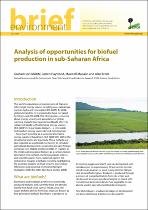JavaScript is disabled for your browser. Some features of this site may not work without it.
- ResearchSpace
- →
- Research Publications/Outputs
- →
- Journal Articles
- →
- View Item
| dc.contributor.author |
Von Maltitz, Graham P

|
|
| dc.contributor.author |
Haywood, Lorren K

|
|
| dc.contributor.author |
Mapako, M

|
|
| dc.contributor.author |
Brent, A

|
|
| dc.date.accessioned | 2009-11-17T10:47:41Z | |
| dc.date.available | 2009-11-17T10:47:41Z | |
| dc.date.issued | 2009-06 | |
| dc.identifier.citation | Von Maltitz, G.P., Haywood, L.K., Mapako, M and Brent, A. 2009. Analysis of opportunities for biofuel production in sub-Saharan Africa. CIFOR Environment Briefs, pp 1-16 | en |
| dc.identifier.uri | http://www.cifor.cgiar.org/Knowledge/Publications/Detail?pid=2798 | |
| dc.identifier.uri | http://hdl.handle.net/10204/3740 | |
| dc.description | Copyright: 2009 Center for International Forestry Research | en |
| dc.description.abstract | The world’s population consumes more oil than any other single energy source, including coal, natural gas, nuclear, hydro and renewables (EIA 2005). By 2030, global demand for oil is expected to have increased by 50 per cent (IEA 2008:116). Rising prices, concerns about energy security and acceptance of global warming impacts have sparked worldwide efforts to replace oil rapidly with alternative energy sources (IEA 2008:55). In particular, biofuels - a renewable hydrocarbon energy source derived from biomass – have much potential as a sustained alternative energy supply of liquid fuels (IEA 2008:307). Within the developing world, and especially Africa, biofuels, are also regarded as a potential mechanism to stimulate agricultural development, create jobs and save foreign exchange (von Maltitz and Brent 2008). In reaction to the initial euphoria about biofuels as a carbon-neutral alternative to fossil fuels, numerous popular articles and scientific papers have cautioned against the global drive towards a biofuels economy, highlighting the potential impacts on food security, poor energy efficiencies and potential environmental harm (Gallagher 2008; IEA 2008: 332; Royal Society 2008). In this article the researchers analyse the opportunities for biofuel production in sub-Saharan Africa. | en |
| dc.language.iso | en | en |
| dc.publisher | Center for International Forestry Research | en |
| dc.subject | Biofuels | en |
| dc.subject | Sub-Saharan Africa | en |
| dc.subject | Biofuel production | en |
| dc.subject | CIFOR Environment Briefs | en |
| dc.title | Analysis of opportunities for biofuel production in sub-Saharan Africa | en |
| dc.type | Article | en |
| dc.identifier.apacitation | Von Maltitz, G. P., Haywood, L. K., Mapako, M., & Brent, A. (2009). Analysis of opportunities for biofuel production in sub-Saharan Africa. http://hdl.handle.net/10204/3740 | en_ZA |
| dc.identifier.chicagocitation | Von Maltitz, Graham P, Lorren K Haywood, M Mapako, and A Brent "Analysis of opportunities for biofuel production in sub-Saharan Africa." (2009) http://hdl.handle.net/10204/3740 | en_ZA |
| dc.identifier.vancouvercitation | Von Maltitz GP, Haywood LK, Mapako M, Brent A. Analysis of opportunities for biofuel production in sub-Saharan Africa. 2009; http://hdl.handle.net/10204/3740. | en_ZA |
| dc.identifier.ris | TY - Article AU - Von Maltitz, Graham P AU - Haywood, Lorren K AU - Mapako, M AU - Brent, A AB - The world’s population consumes more oil than any other single energy source, including coal, natural gas, nuclear, hydro and renewables (EIA 2005). By 2030, global demand for oil is expected to have increased by 50 per cent (IEA 2008:116). Rising prices, concerns about energy security and acceptance of global warming impacts have sparked worldwide efforts to replace oil rapidly with alternative energy sources (IEA 2008:55). In particular, biofuels - a renewable hydrocarbon energy source derived from biomass – have much potential as a sustained alternative energy supply of liquid fuels (IEA 2008:307). Within the developing world, and especially Africa, biofuels, are also regarded as a potential mechanism to stimulate agricultural development, create jobs and save foreign exchange (von Maltitz and Brent 2008). In reaction to the initial euphoria about biofuels as a carbon-neutral alternative to fossil fuels, numerous popular articles and scientific papers have cautioned against the global drive towards a biofuels economy, highlighting the potential impacts on food security, poor energy efficiencies and potential environmental harm (Gallagher 2008; IEA 2008: 332; Royal Society 2008). In this article the researchers analyse the opportunities for biofuel production in sub-Saharan Africa. DA - 2009-06 DB - ResearchSpace DP - CSIR KW - Biofuels KW - Sub-Saharan Africa KW - Biofuel production KW - CIFOR Environment Briefs LK - https://researchspace.csir.co.za PY - 2009 T1 - Analysis of opportunities for biofuel production in sub-Saharan Africa TI - Analysis of opportunities for biofuel production in sub-Saharan Africa UR - http://hdl.handle.net/10204/3740 ER - | en_ZA |






